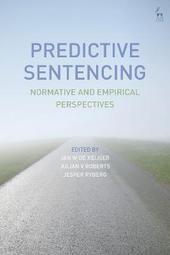
|
Predictive Sentencing: Normative and Empirical Perspectives
Paperback / softback
Main Details
| Title |
Predictive Sentencing: Normative and Empirical Perspectives
|
| Authors and Contributors |
Edited by Professor Jan W de Keijser
|
|
Edited by Julian V Roberts
|
|
Edited by Jesper Ryberg
|
| Physical Properties |
| Format:Paperback / softback | | Pages:320 | | Dimensions(mm): Height 234,Width 156 |
|
| ISBN/Barcode |
9781509946082
|
| Classifications | Dewey:345.0772 |
|---|
| Audience | | Tertiary Education (US: College) | |
|---|
|
Publishing Details |
| Publisher |
Bloomsbury Publishing PLC
|
| Imprint |
Hart Publishing
|
| Publication Date |
17 December 2020 |
| Publication Country |
United Kingdom
|
Description
Predictive Sentencing addresses the role of risk assessment in contemporary sentencing practices. Predictive sentencing has become so deeply ingrained in Western criminal justice decision-making that despite early ethical discussions about selective incapacitation, it currently attracts little critique. Nor has it been subjected to a thorough normative and empirical scrutiny. This is problematic since much current policy and practice concerning risk predictions is inconsistent with mainstream theories of punishment. Moreover, predictive sentencing exacerbates discrimination and disparity in sentencing. Although structured risk assessments may have replaced 'gut feelings', and have now been systematically implemented in Western justice systems, the fundamental issues and questions that surround the use of risk assessment instruments at sentencing remain unresolved. This volume critically evaluates these issues and will be of great interest to scholars of criminal justice and criminology.
Author Biography
Jan W de Keijser is Professor of Criminology at the University of Leiden, The Netherlands. Julian V Roberts is Professor of Criminology at the University of Oxford, and Fellow of Worcester College, Oxford. Jesper Ryberg is Professor of Ethics and Philosophy of Law at the Department of Philosophy at Roskilde University, Denmark.
ReviewsThe editors of this volume have assembled a distinguished group of scholars whose contributions incisively explore the many issues raised by predictive sentencing. The issues include its fit with standard views about the aims of legal punishment and with related moral concepts such as the rights and dignity of offenders. They also include the numerous complex and contested factors that go into making predictions about future offending, the accuracy of the resulting predictions, and the myriad uses to which they have been and might be put in sentencing. The volume is especially noteworthy for the range of disciplinary perspectives it contains, as well as for its well-informed and thoughtful analyses of the feasibility and defensibility of using predictions in sentencing. -- Professor Richard Lippke, Chair of the Department of Criminal Justice at Indiana University
|